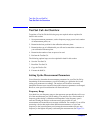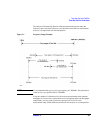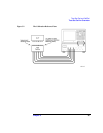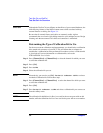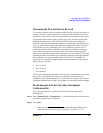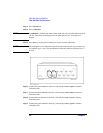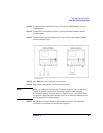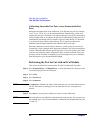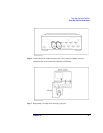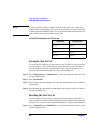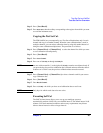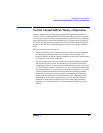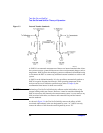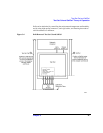
40 Chapter 3
Test Set Cal and SelfCal
Test Set Cal: An Overview
Calibrating: Insertable Port Pairs versus Noninsertable Port
Pairs
During the through portion of the calibration, if an adjacent port pair (for example,
1-to-2, 3-to-4, 5-to-6, etc.) can be connected directly without using a cable or an
adapter, the port pair is insertable. If an adjacent port pair can only be connected by
using a through cable or an adapter, the port pair is noninsertable. If the port pair is
noninsertable, the through cable or adapter is not used when the DUT is measured,
so its electrical delay must be subtracted out. This is done by modifying the
definition of the through-standard in the calibration kit for each port.
Most test fixtures have fixed-location connectors, so their port pairs can only be
connected by using a through cable. During the calibration you will be prompted to
connect a through cable between specific port pairs. If you can connect your cables
to the test set so that the cables’ adjacent port pairs are male-to-female, all of your
port pairs will be insertable. Configuring your test setup this way saves calibration
time and improves your measurement throughput.
Performing the Test Set Cal with an ECal Module
This section describes how to perform the Test Set Cal with an ECal module.
Step 1. Press [Channel Next] or [Channel Prev] to select the channel for which you want
to execute multi-port test set calibration.
Step 2. Press [Cal].
Step 3. Press
Test Set Cal.
Step 4. Press
Calibration.
NOTE If Calibration is disabled, the status of the multi-port test set of this channel may be
off. See "Procedure of setting ports for the multi-port test set" in the previous
section.
Step 5. Press
Port x-y (a port pair for which you want to execute calibration).
NOTE The multi-port test set calibration is performed for each port pair. If you want to use,
for example, ports 1 and 3 for measurement, calibration must be performed for ports
1-2 and 3-4.



